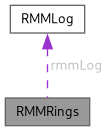Classe to manage the setup, configuration, and teardown of RMM rings. More...
#include <RMMRings.h>

Public Member Functions | |
| RMMRings (RMMRegisterAccess &RMMRegs, Topology &topology) | |
Constructor for the RMMRings instance. | |
| rmmStatus | teardownAllRings () |
| Teardown all possible rings. | |
| rmmStatus | tearDownRing (int ring, bool waitTime=true) |
| Teardown a specific ring of the RMM. | |
| void | bringUpAllRings () |
| Initializes and configures all active rings. | |
| void | bringUpAllRingsInSequence () |
| Initializes and configures all active rings, one by one. | |
| ringStatus | checkRings () |
| Perform a slow control read from all FEs in the topology to confirm the ring is active. | |
| void | readyForBulkData () |
| Inform all FEs in the topology that they can start sending bulk data. | |
| void | resetPacketCounters () |
| Reset all packet counters back to 0. Useful if the counters start saturating at 0xFFFF_FFFF. | |
| int | getPollTimeout () |
| Gets the timeout for polling in seconds. | |
| void | setPollTimeout (int value) |
| Sets the timeout for polling in seconds. Timeout starts counting after the polling exceeds initial estimated, not at start of polling. | |
| rmmStatus | getPacketCounters (PacketCountMap *packets) |
| Return the updated packet counters.. There are 2 types of counters, one set that counts the per-fibre (odd and even) bulk data packets, and then one set that counts per-node in the output queues. | |
| rmmStatus | getSideChannelPacketCounter (uint8_t node, uint32_t *value) |
| Retrieves the packet counter value for a specific side channel. | |
Public Attributes | |
| RMMLog | rmmLog |
| Log handler for RMMRings messages. | |
Static Public Attributes | |
| static constexpr int | FE_DEFAULT_LOCK_TIME = 16 |
Friends | |
| class | FrontEndBase |
Detailed Description
Classe to manage the setup, configuration, and teardown of RMM rings.
This class is responsible for configuring and managing RMM rings, handling packet counters, synchronizing nodes, and ensuring the correct operation of the transceivers. It interacts with the RMMRegisterAccess for hardware register manipulation and Topology for managing the system topology.
Constructor & Destructor Documentation
◆ RMMRings()
| RMMRings::RMMRings | ( | RMMRegisterAccess & | RMMRegs, |
| Topology & | topology ) |
Constructor for the RMMRings instance.
- Parameters
-
RMMRegs Reference to an RMMRegisterAccessinstance for hardware register control.topology Reference to a Topologyinstance for managing the system topology.
Member Function Documentation
◆ bringUpAllRings()
| void RMMRings::bringUpAllRings | ( | ) |
Initializes and configures all active rings.
This method performs the setup required to bring up all rings in the system. It first calls commonRingSetup() to apply common configurations, then iterates over all active rings retrieved from the topology and asynchronously executes ringSetup() for each ring.
The setup tasks are executed concurrently using std::async to improve performance, and the method waits for all tasks to complete before returning.
◆ bringUpAllRingsInSequence()
| void RMMRings::bringUpAllRingsInSequence | ( | ) |
Initializes and configures all active rings, one by one.
same as RMMRings::bringUpAllRings, but with sequential execution. Intended to be used by developers who want to troubleshoot problematic ring so that error logs are not flooded by other rings that are working well.
◆ checkRings()
| ringStatus RMMRings::checkRings | ( | ) |
Perform a slow control read from all FEs in the topology to confirm the ring is active.
- Returns
- ringStatus An enumeration indicating the status of the operation.
- See also
- ringStatus
◆ getPacketCounters()
| rmmStatus RMMRings::getPacketCounters | ( | PacketCountMap * | packets | ) |
Return the updated packet counters.. There are 2 types of counters, one set that counts the per-fibre (odd and even) bulk data packets, and then one set that counts per-node in the output queues.
- Parameters
-
packets pointer to packets counters map to be updated.
- Returns
- rmmStatus success
◆ getPollTimeout()
| int RMMRings::getPollTimeout | ( | ) |
Gets the timeout for polling in seconds.
- Returns
- timeout for polling in seconds after estimated time.
◆ getSideChannelPacketCounter()
| rmmStatus RMMRings::getSideChannelPacketCounter | ( | uint8_t | sideChIdx, |
| uint32_t * | value ) |
Retrieves the packet counter value for a specific side channel.
- Parameters
-
[in] sideChIdx The side channel index for which the packet counter is requested. Valid indices are 0 and 1. [out] value Pointer to a uint32_t variable where the packet counter value will be stored.
- Returns
rmmSuccessif the packet counter was successfully retrieved.-
rmmErrorif the side channel index is invalid.
◆ setPollTimeout()
| void RMMRings::setPollTimeout | ( | int | value | ) |
Sets the timeout for polling in seconds. Timeout starts counting after the polling exceeds initial estimated, not at start of polling.
- Parameters
-
[in] value value in seconds to set timeout.
- Returns
- void
◆ teardownAllRings()
| rmmStatus RMMRings::teardownAllRings | ( | ) |
Teardown all possible rings.
- Returns
- status
◆ tearDownRing()
| rmmStatus RMMRings::tearDownRing | ( | int | ring, |
| bool | waitTime = true ) |
Teardown a specific ring of the RMM.
- Parameters
-
ring The index of the ring to tear down. waitTime If true, the function waits for the full teardown timeout.
- Returns
- - rmmSuccess if the teardown completed successfully or was already in progress.
- mmError if the ring index is out of range or an error occurred while writing registers.
The documentation for this class was generated from the following files:
- include/RMMRings.h
- src/RMMRings.cpp
Generated by